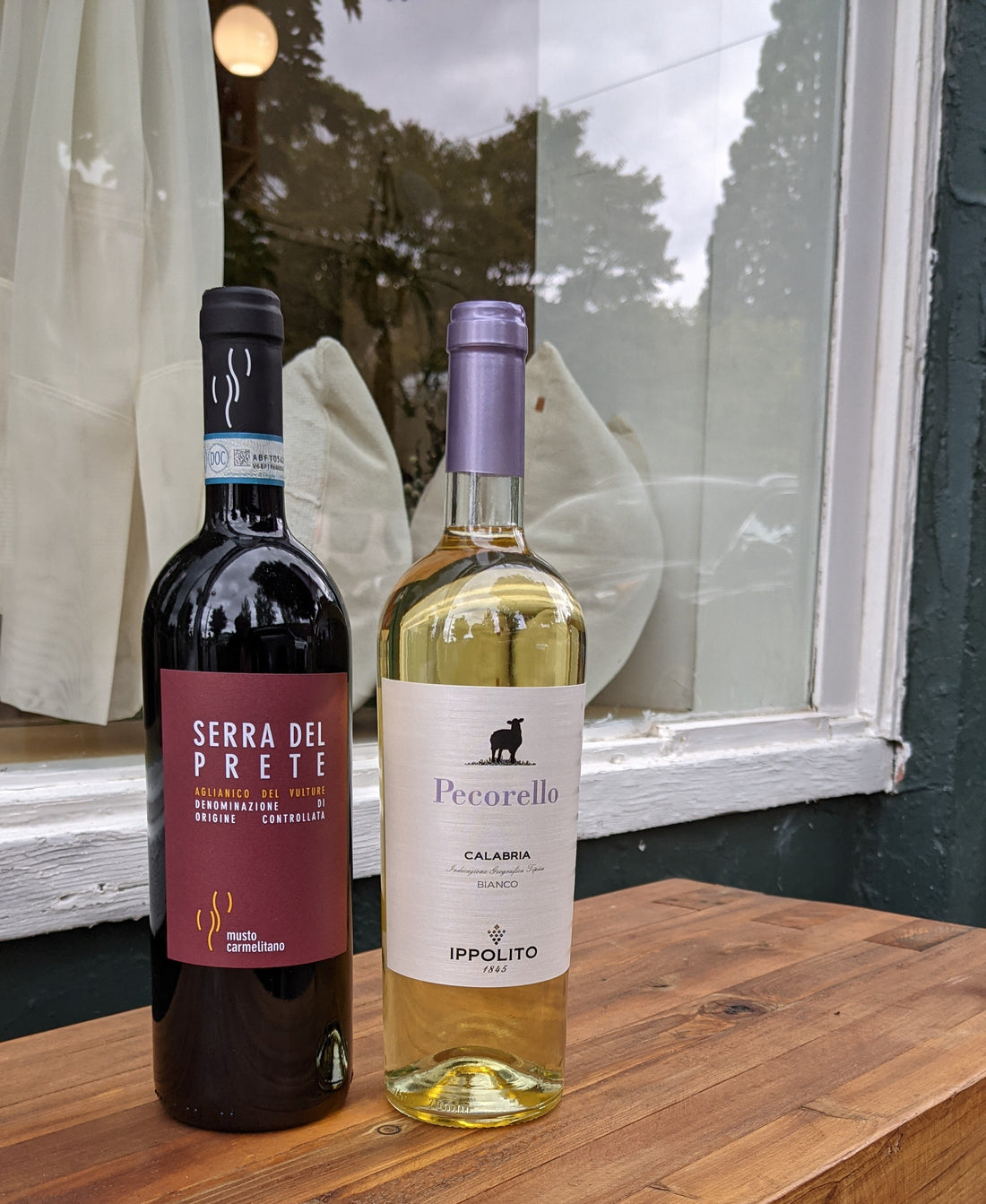
July 2021 - Calabira / Basilicata, Southern Italy
Dogwood Wine Club - July 2021
Calabria and Basilicata, Southern Italy
Featuring -
Ippolito 1845, ‘Pecorello’ Calabria Bianco 2019
Musto Carmelitano, ‘Serra Del Prete’ Aglianico del Vulture 2016
In honor of the arid, awful Heat Dome that graced the Northwest this weekend, we have decided to focus on two perennially hot and arid regions for our inaugural wine club.
The first, Calabria, is where we sourced our white wine from. This is the most southerly region of mainland Italy, jutting out between the Tyrrhenian and Ionian Seas. (I always explain it as, “If Italy is a boot, Calabria is the toe.”) This is the region where the Greeks first cultivated grapes when they expanded West. Now native grapes such as ‘Greco Bianco’ attest to this heritage. Today, Calabria is incredibly poor and possibly Italy’s most troubled region, with severe issues relating to mafia, unemployment, immigration, and drought.
Geopolitical issues aside, the area is wonderfully idyllic from a winegrowing and culinary sense. White calcareous soils are home to vineyards and olive groves with views of the sea from basically anywhere in the region, especially around Cirò Marina. The warm air blowing across the Mediterranean from the Sahara is tempered by cool mountain breezes from the Apennines Mountains to the east. Chili Calabrese are cultivated for their potential as a dried or preserved condiment. Lemons and other citrus are grown for their aromatic oils. And whatever wine that is good enough to be bottled and sold as Calabrian-designate (rather than sold in bulk for blending up North), is pretty dang good in a charming, rustic sense!
Basicalata, the neighboring region to the Northwest, is a sparsely populated, mountainous region with a wonderful amount of history and lore. The ancient name of Lucania hints at its Greek and Roman populations of millenia past. Ruins of temples and ancient cities are easily visitable and largely untouched in this area. The rugged, mountainous landscape and arid climate has kept any modern mega-cities from forming here. (Potenza, the region’s capital and largest city, is home to just 60,000 people).
Quality winegrowing in Basilicata can be largely centralized on the slopes of Monte Vulture (pronounced Vol-Too-Rey… it rhymes with Monte). Here, Aglianico (silent G!) is grown and expressed in one of it’s finest forms. The soils are intensely volcanic, with a reputation for imperviousness and difficulty to farm. Historically, there hasn’t been much in the way of wine growing and quality production was in the hands of only a few passionate producers. However, once more vignerons discovered the powerful and vibrant nature of Aglianico from here, more producers began to elevate the region as a whole. If you like the Musto Carmelitano wine, keep on the lookout for Vulture wines from Grifalco, Paternoster, Elena Fucci & del Notaio.
Ippolito 1845, ‘Pecorello’ Calabria Bianco 2019
One would be remiss to write about Calabrian wine without mention of Ippolito. The winery is deeply ingrained with the history of the region and has been since before Oregon was even a state! Founded by Vincenzo Ippolito in 1845 (hence the name), the winery sits in the heart of Cirò Marina and sources from several vineyards overlooking the village. They have been pivotal in elevating Calabrian wine to the world stage and remain dedicated to organic farming, low-intervention winemaking, and native grapes (Gaglioppo, Greco Bianco, Nerello Calabrese and Pecorello). In contrast to their history, however, their cellar is modern and their wines are clean and precise. Moreover, they have been resolutely focused on quality wine rather than quantity. While many producers of this pedigree may have spent decades expanding their holdings and upping production, Ippolito remains at a modest (by Italian standards) 10,000 case production level.
This bottling is 100% Pecorello, produced from younger vines planted in 2005. As a whole, the variety is largely un-mentioned in wine literature (even the great Ian d’Agata references it as a different, red-tinged grape), however it is slowly gaining popularity in Calabria. Fermented and minimally aged in stainless steel, the result is a wine that is incredibly transparent to what the variety can offer - stone fruit, melon, and lemon notes with a freshness on the palate. It remains juicy yet still has driving acid that gives a long persistent finish. It is a unique wine and, I think, very enjoyable to drink.
Pairing: Bucatini w/ an Anchovy, Garlic, Calabrian Chili sauce. Lemon zest encouraged.
Musto Carmelitano, ‘Serra Del Prete’ Aglianico del Vulture 2016
If the Ippolito story is one of Southern Italian resilience and stoicism, the Carmelitano family’s story is one from the other side of the same coin. Originally grape farmers and bulk wine producers for over 100 years, the current iteration of the Musto Carmelitano winery didn’t truly start until patriarch Francesco Carmelitano returned from England and reclaimed the family’s vineyards. Like many other Southerners, he had expatriated in search for a better life but returned to his roots years later. It was his daughter and son, Elisabetta and Luigi, that saw the potential of the grapes beyond bulk wine and launched a true wine estate - Musto Carmelitano.
Today, they organically farm 32 acres of vineyards and only produce 2,500 cases of wine each vintage. The winery is also notable in the fact that they do not own any smaller oak barrels. Aglianico is typically known as a wild beast of a grape that many try to tame with oak. However, with the higher elevation and age of their vineyards (many were planted by the duo’s great-grandfather), the grapes have a lifted note that would only be diminished with the addition of large amounts of wood. Everything is fermented in stainless steel tanks and aged in either concrete, steel tank, or large neutral oak tonneaux.
This particular vineyard bottling - Serra del Prete (“Priest’s Garden”) - is named after the layout of the vineyard, which looks like a country priest’s hat: tall plateau in the center with fans or brims on each side. The Aglianico vines here are 50 years old on average, planted on a mix of volcanic and clay soils, at 2000’ elevation. They are harvested at the end of November (imagine that!!) and are fermented in steel and aged in concrete tank. The wine has a youthful elegance to it yet still complex. Licorice and cedar box are met with cherry and plum. The acidity remains medium-high even though the grapes hung on the vine for months, and the tannins are fine yet persistent. (Fun fact - skin tannins, like these, are generally more noticeable on the front of the palate while oak tannins will be present further back). This is Aglianico in it’s fun, soft and flirtatious stage. Believe me, it can get wildly intense beyond that!
Pairing: Grilled or roasted red meat with plenty of rosemary, thyme and black pepper.
